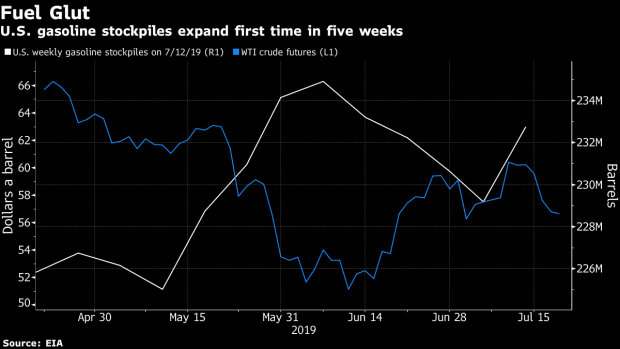Jul 18, 2019
Oil Holds Losses as U.S. Fuel Stockpile Gain Feeds Demand Fears
, Bloomberg News

(Bloomberg) -- Oil traded near a two-week low as an increase in U.S. fuel stockpiles spurred concern that demand is waning in the world’s biggest crude consumer.
Futures were little changed in New York after dropping 1.5% on Wednesday. American gasoline and distillates inventories rose by a combined 9.25 million barrels last week, according to government data, well above expectations of analysts surveyed by Bloomberg. Crude supplies did fall more than forecast, driven in part by output halts in the Gulf of Mexico due to storm Barry.
Oil has lost more than 5% this week as the specter of a renewed U.S-China trade conflict and stuttering American consumption dent the demand outlook. Still, the possibility of crude flows being disrupted from the Middle East remain after Iran’s Foreign Minister Mohammad Javad Zarif damped the prospect of the OPEC producer opening talks with the Trump administration. Washington “shot itself in the foot’’ by pulling out of the nuclear accord, he said.
“Oil markets are very heavy under the weight of a counter-seasonal build in gasoline inventories, which is typically a harbinger of worse things to come,” said Stephen Innes, managing partner at Vanguard Markets Pte Ltd. “Weaker gasoline consumption is adding to existing global demand concerns.”
West Texas Intermediate for August delivery dropped 5 cents to $56.73 on the New York Mercantile Exchange as of 7:31 a.m. in London after declining as much as 0.6% earlier. The contract lost 84 cents to $56.78 on Wednesday, the lowest close since July 2.
Brent for September settlement rose 7 cents to $63.73 a barrel on the ICE Futures Europe Exchange. It fell 1.1% to $63.66 on Wednesday. The global benchmark crude traded at a premium of $6.88 to WTI for the same month.
See also: Oil Firms Fight for Their Right to Ship Gasoline to Mexico
U.S. gasoline stockpiles increased by 3.57 million barrels last week, rising for the first time in five weeks, according to Energy Information Administration data Wednesday. The median estimate in the survey forecast a 2.4-million barrel drop. Distillate inventories rose by 5.69 million barrels, while crude supplies fell by 3.12 million barrels, according to EIA figures.
Iran is capable of shutting the Strait of Hormuz -- a crucial choke-point for oil flows -- but doesn’t want to do it because the waterway and the Persian Gulf are its lifeline, Zarif said Wednesday in an interview with Bloomberg Television in New York.
--With assistance from James Thornhill.
To contact the reporter on this story: Sharon Cho in Singapore at ccho28@bloomberg.net
To contact the editors responsible for this story: Serene Cheong at scheong20@bloomberg.net, Ben Sharples, Andrew Janes
©2019 Bloomberg L.P.


